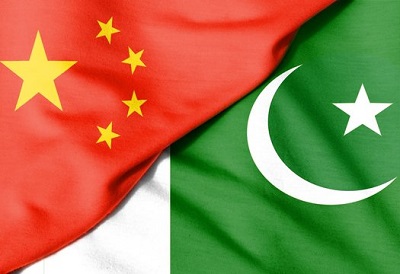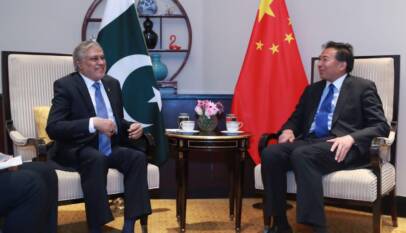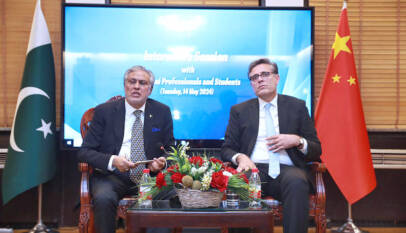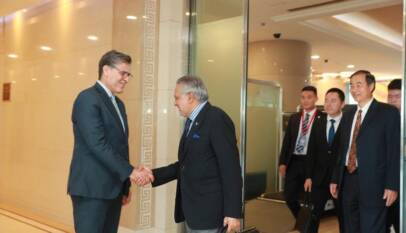CPEC second phase to focus on industrialization, agriculture: Hussain H Zaidi
Hussain H Zaidi, a senior journalist writes that the strategic shift from geo-politics to geo-economics is a significant initiative of the Pakistani government. He highlights that the first phase of CPEC focused on infrastructure and energy projects and between 2015-16 and 2020-21, $4.86 billion in Chinese investment was made in Pakistan. He noted that China has become the largest source of FDI into Pakistan. Similarly, the second phase of CPEC will focus on industrial development and agriculture. Pakistan is looking to receive considerable Chinese investment in manufacturing and modernization of agriculture, particularly in the Special Economic Zones (SEZs) and Gwadar Free Zone. He concludes that CPEC is open to third-party participation and it is hoped that Chinese investment will encourage other countries to invest in Pakistan.
ISLAMABAD:
The strategic shift from geo-politics to geo-economics is a welcome initiative on the part of Pakistan government.
In a world where the relative position of a nation is determined primarily by its economic strength, the focus on geo-economics embodies a logical response to the national and international challenges. Geography has always been considered an element of national power. All else equal, some countries because of their location are in a better position to attract trade and investment than others.
Pakistan is a country which is also strategically located. To the north of Pakistan is China, the world’s second largest economy and the largest trading nation. To the east, lies India, which is one of the key emerging economies.
To the northwest of Pakistan is landlocked Afghanistan and beyond that landlocked and energy-rich Central Asia. Pakistan provides the shortest land route to Afghanistan for its overseas trade.
To the southwest is Iran, which connects Pakistan to the oil and gas abundant Middle East. The Arabian Sea to the south, which forms the northwestern part of the Indian Ocean, constitutes one of the world’s busiest trade routes. Going by its strategic location, Pakistan should have become a trade, transport and investment hub.
On the contrary, the strategic location turned out to be Pakistan’s Achilles Heel and reduced it to a hotbed of militancy, partly because national priorities were misplaced and partly because world or regional powers used the country’s territory for waging their proxy wars. Foreigners by and large saw Pakistan as an instable country with a high political risk, where their lives and assets wouldn’t be safe.
Hence, despite entering into different regional and bilateral preferential trade arrangements, Pakistan couldn’t become part of global value chains (GVCs), which account for nearly half of the global trade, despite its locational advantage and having arguably the most liberal trade and investment regimes in the region. As a result, the country received meagre FDI inflows over the years and had to rely mainly on foreign loans to finance the trade and current account deficits, thus accumulating a massive debt.
Pakistan’s geo-strategic environment remains uncertain, thus further constraining its economic choices.
The lingering Kashmir issue together with BJP-led New Delhi’s growing hegemonic posture will make it difficult for Pakistan to normalise trade with India. As a result, the economic potential of South Asian Association for Regional Cooperation (Saarc) is likely to remain underutilised.
If Afghanistan continues to remain instable, the prospects for trade with Central Asian Republics will remain dim.
The United States’ return to the Iran nuclear deal and withdrawal of US sanctions on Iran hangs in the balance and thus will continue to cast its shadow on the revival of full-scale trade between Pakistan and Iran.
Cashing in on opportunities
Despite such constraints, substantial opportunities are offered by the international economic environment.
The new national narrative of geo-economics, if implemented in true letter and spirit, would help to realise Pakistan’s immense economic potential and capitalise on these opportunities.
The most obvious of such opportunities are offered by the Belt and Road Initiative (BRI), the mega infrastructure and development programme sponsored by the Chinese government. Announced in 2013, the BRI is geared towards connecting Asia with Africa and Europe by land, maritime and digital networks.
Partly because of its strategic location and partly because of its outstanding relations with China, Pakistan has a very important role to play in BRI implementation.
China-Pakistan Economic Corridor (CPEC), which was unveiled in 2015, is one of the six corridors under BRI. CPEC links Chinese province of Xinjiang with Pakistan and substantially reduces time and cost of western China’s trade with the Middle East, African and European countries.
The first phase of CPEC focused on infrastructure and energy projects and between 2015-16 and 2020-21, $4.86 billion in Chinese investment was made in Pakistan, mainly in these two sectors.
Because of CPEC, China has become the largest source of FDI into Pakistan. The second phase of CPEC, which has recently started, will target industrial development and agriculture. Pakistan is looking to receive considerable Chinese investment in manufacturing and modernisation of agriculture, particularly in the Special Economic Zones (SEZs) and Gwadar Free Zone, which offer a lot of incentives to foreign investors in the form of exemption from internal and import taxes.
It may be mentioned that because of increase in wages in China, many labour-intensive industries are relocating offshore. Because of its large labour force and competitive wages, Pakistan can serve as a credible option for the Chinese enterprises wishing to relocate to low-wage countries.
CPEC is open to participation by third countries and it is hoped that Chinese investment will encourage other capital abundant countries to step up investment in Pakistan and thus will enable the country to realise its investment potential as well as become part of some of the GVCs in such sectors as information and communication technology, textile and automobile.
Already quite a few mobile phone brands, mostly Chinese and also including Samsung, have entered Pakistan.
Challenges in the way
At the same time, there are some challenges that need to be addressed. Because of space constraints, only three may be mentioned here.
Ensuring security of foreign investors and workers and safety of foreign assets will be the biggest challenge for Pakistan. Incidents such as the lynching of a Sri Lankan manager of a factory in Sialkot, and the extremist narrative which encourages such incidents, if not controlled, may wreck the success of geo-economics.
Continuity of liberal economic, particularly investment, policies will also be crucial. The objective should be to minimise the cost of doing business, so that the advantage offered by lower wages is not offset by high barriers to trade and investment.
The third important challenge will be ensuring efficient and effective economic governance. Governance in Pakistan continues to remain hostage to the principle of “administrative efficiency,” which looks upon every problem as primarily administrative and which is a relic of the colonial era. Economic management requires specialised knowledge and skills. The Economists and Planners Group is a specialised cadre, which, as the name suggests, can take the lead in economic management.
However, economic management remains an almost exclusive domain of the officials of Pakistan Administrative Service (PAS), whose core competence is related to administering districts and divisions primarily with a view to collecting revenue and maintaining law and order.
Dealing with intricate economic issues of the 21st century through a 19th century administrative system can’t make for efficient and effective economic management.
Ambassador Zaidong highlights China’s embrace of innovation for sustainable development in Pakistan partnership
In recent months, the term “new quality productive forces” has sparked intense discussions…













